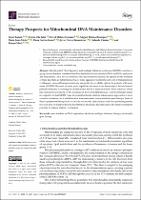| dc.contributor | Vall d'Hebron Barcelona Hospital Campus |
| dc.contributor.author | Ramon Pasías, Javier Francisco |
| dc.contributor.author | Vila Julià, Ferran |
| dc.contributor.author | Molina Granada, David |
| dc.contributor.author | Molina Berenguer, Miquel |
| dc.contributor.author | Melia Grimal, Mª Jesus |
| dc.contributor.author | García Arumí, Elena |
| dc.contributor.author | Torres Torronteras, Javier |
| dc.contributor.author | Cámara Navarro, Yolanda |
| dc.contributor.author | Martí Seves, Ramón |
| dc.date.accessioned | 2022-02-25T13:48:12Z |
| dc.date.available | 2022-02-25T13:48:12Z |
| dc.date.issued | 2021-06 |
| dc.identifier.citation | Ramón J, Vila-Julià F, Molina-Granada D, Molina-Berenguer M, Melià MJ, García-Arumí E, et al. Therapy Prospects for Mitochondrial DNA Maintenance Disorders. Int J Mol Sci. 2021 Jun;22(12):6447. |
| dc.identifier.issn | 1422-0067 |
| dc.identifier.uri | https://hdl.handle.net/11351/7094 |
| dc.description | Agotamiento; Terapia génica; Mitocondrias |
| dc.language.iso | eng |
| dc.publisher | MDPI |
| dc.relation.ispartofseries | International Journal of Molecular Sciences;22(12) |
| dc.rights | Attribution 4.0 International |
| dc.rights.uri | http://creativecommons.org/licenses/by/4.0/ |
| dc.source | Scientia |
| dc.subject | ADN - Duplicació |
| dc.subject | Mitocondris - Malalties - Tractament |
| dc.subject.mesh | Mitochondrial Diseases |
| dc.subject.mesh | /therapy |
| dc.subject.mesh | DNA Replication |
| dc.title | Therapy Prospects for Mitochondrial DNA Maintenance Disorders |
| dc.type | info:eu-repo/semantics/article |
| dc.identifier.doi | 10.3390/ijms22126447 |
| dc.subject.decs | enfermedades mitocondriales |
| dc.subject.decs | /terapia |
| dc.subject.decs | replicación del ADN |
| dc.relation.publishversion | https://doi.org/10.3390/ijms22126447 |
| dc.type.version | info:eu-repo/semantics/publishedVersion |
| dc.audience | Professionals |
| dc.contributor.organismes | Institut Català de la Salut |
| dc.contributor.authoraffiliation | [Ramón J, Vila-Julià F, Molina-Granada D, Molina-Berenguer M, Melià MJ, García-Arumí E, Torres-Torronteras J, Cámara Y, Martí R] Grup de Recerca en Malalties Neuromusculars i Mitocondrials, Vall d’Hebron Institut de Recerca, Barcelona, Spain. Universitat Autònoma de Barcelona, Bellaterra, Spain. Biomedical Network Research Centre on Rare Diseases (CIBERER), Instituto de Salud Carlos III, 28029 Madrid, Spain |
| dc.identifier.pmid | 34208592 |
| dc.identifier.wos | 000666020300001 |
| dc.rights.accessrights | info:eu-repo/semantics/openAccess |

 Área privada
Área privada Contacto
Contacto







